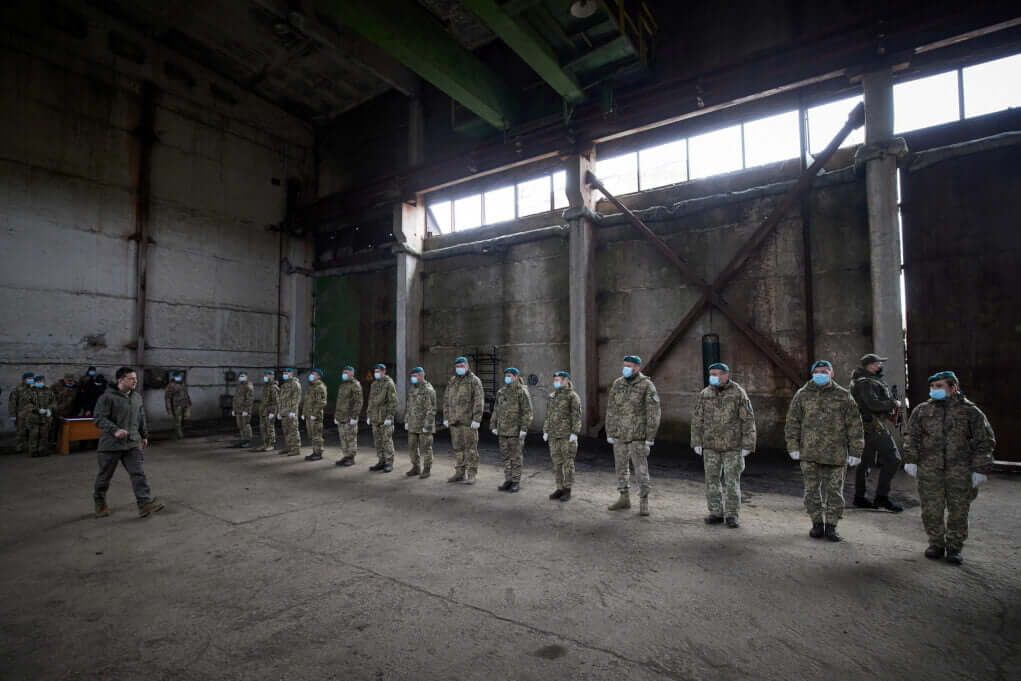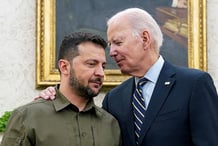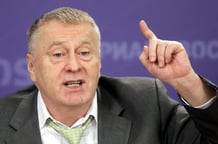Russian military buildup continued near the Ukrainian border, deepening global concern about Moscow’s ultimate intentions as senior Russian officials and state media escalate their inflammatory attacks.
The military buildup was accompanied by an increase in threats of war by Russian officials. Dmitry Kozak, a senior Kremlin official, warned that a major escalation in the conflict would mark “the beginning of the end of Ukraine,” according to Foreign Policy .
The Kremlin also announced on Friday that it fears the resumption of large-scale fighting in eastern Ukraine and that it may take steps to protect civilians there, in a stark warning that comes amid a mobilization of Russian forces along the border.
The statement of Dmitry Peskov, a spokesman for Russian President Vladimir Putin, reflects the Kremlin’s determination to prevent Ukraine from using force to try to regain control of the lands in the hands of separatists in the east of the country.
The Ukrainian army chief rejected Russian allegations that his country’s forces were preparing to launch an attack on eastern rebels. Colonel-General Ruslan Khomchak, commander-in-chief of the Ukrainian armed forces, rejected Moscow’s claims about alleged Ukrainian preparations for an attack in the east as part of a “disinformation campaign” and a “hybrid war”.
Ukrainian forces have been fighting Russian-backed separatists in eastern Ukraine shortly since Moscow’s annexation of Ukraine’s Crimea peninsula in 2014. More than 14,000 people have been killed in the conflict, and efforts to negotiate a political settlement have stalled.
Frequent violations
Ukraine and the West accuse Russia of sending troops and weapons to help the separatists, accusations that Moscow has denied. In recent weeks, Western and Ukrainian officials have voiced their concerns about increasingly frequent ceasefire violations in the heart of the country’s industrial zone, known as the Donbas.
They also expressed concern about the increased mobilization of Russian forces along the border with Ukraine.
During a call with Putin on Thursday, German Chancellor Angela Merkel called for “the withdrawal of these reinforcements in order to achieve a de-escalation of the situation.”
In a telephone call on Friday, US Secretary of State Anthony Blinken and French Foreign Minister Jean-Yves Le Drian discussed “Russia’s need to end its dangerous and irresponsible rhetoric and its military buildup in the occupied Crimea and along the Ukrainian border, and unilateral Russian provocations along the front line in eastern Ukraine.” According to State Department spokesman Ned Price.
In response, Peskov said that Russia is free to deploy its forces wherever it wants on its territory. He accused the Ukrainian army of “escalating provocative actions” along the Line of Control in the east, which threatens Russia’s security.
Moscow was pressing Ukraine to implement a peace agreement brokered by France and Germany in Minsk, Belarus, in 2014 and 2015, which calls for local elections in Donbas, the withdrawal of foreign armed forces, and the return of the border with Russia to Ukraine.
The government of Ukrainian President Volodymyr Zelenskyyy refused to grant more autonomy to the territories controlled by the separatists, fearing that it would give Moscow the opportunity to gain a stronger foothold in the region.
The ceasefire expired
“The diplomatic solution … requires a fundamental change in the position of the Kiev authorities. If the Kiev authorities agree to recognize the federal structure of Ukraine, and if they agree to equal status of the Russian language in Ukraine side by side,” Konstantin Sevkov, a Moscow-based military analyst, told the Wall Street Journal. Together with the Ukrainian language, the entire problem in Donbas will be removed. ”
But analysts said the recent upsurge in violence, the increase in Russian forces and increasing threats to Moscow had spoiled the chances for a diplomatic settlement.
“The ceasefire has ended … President Zelenskyyy’s strategy for negotiating with Moscow has generally ended,” said Mykola Kapitonenko, associate professor at the Institute of International Relations in Kiev and advisor to the Ukrainian Parliamentary Committee for Foreign Affairs.
Russia also believes that “the Minsk process is in a dead-end and there is no hope that there will be any kind of settlement hoped for a year ago, so they should improve their negotiating position through some measures.”
For her part, Alyona Gutmanchuk, director of the Kyiv-based Center for New Europe, said: “It is clear that Ukraine favours a diplomatic solution, but perhaps the Ukrainian president’s biggest mistake is that he was too naive when he thought that he could reach a good agreement with Putin and he would do so on Ukrainian terms.”.
Zelenskyyy emphasized that speeding up Ukraine’s path to NATO membership would help prevent a deeper conflict with Russia.
But Russian officials and pro-Kremlin analysts say NATO’s participation will exacerbate tensions in the region.
Kirill Mikhailov, a researcher with the Conflict Intelligence Team, said that the most bewildering and worrying thing about the military buildup in Voronezh is the clearly offensive posture. The region borders the government-controlled Ukraine, not the separatist regions of Donetsk and Luhansk, where separatists depend on Russian support.
Andrea Kendall Taylor, director of the Transatlantic Security Program at the Center for a New American Security, added: “I still think it’s more than just Russian signals. It is clear that I cannot rule out that it could turn into something more dangerous.”















May better sense prevail and both the sides come to reach a peaceful solution to the present crisis